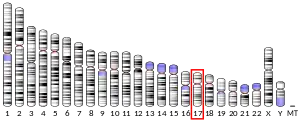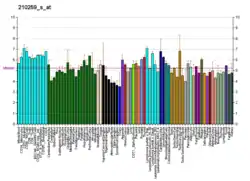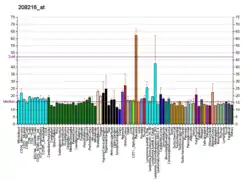DLX4
Homeobox protein DLX-4 is a protein that in humans is encoded by the DLX4 gene.[4]
Function
Many vertebrate homeobox-containing genes have been identified on the basis of their sequence similarity with Drosophila developmental genes. Members of the Dlx gene family contain a homeobox that is related to that of Distal-less (Dll), a gene expressed in the head and limbs of the developing fruit fly. The Distal-less (Dlx) family of genes comprises at least 6 different members, DLX1-DLX6. The DLX proteins are postulated to play a role in forebrain and craniofacial development. Three transcript variants have been described for this gene, however, the full length nature of one variant has not been described. Studies of the two splice variants revealed that one encoded isoform (BP1) functions as a repressor of the beta-globin gene while the other isoform lacks that function.[4]
References
- GRCh38: Ensembl release 89: ENSG00000108813 - Ensembl, May 2017
- "Human PubMed Reference:". National Center for Biotechnology Information, U.S. National Library of Medicine.
- "Mouse PubMed Reference:". National Center for Biotechnology Information, U.S. National Library of Medicine.
- "Entrez Gene: DLX4 distal-less homeobox 4".
Further reading
- Nakamura S, Stock DW, Wydner KL, et al. (1997). "Genomic analysis of a new mammalian distal-less gene: Dlx7". Genomics. 38 (3): 314–24. doi:10.1006/geno.1996.0634. PMID 8975708.
- Quinn LM, Johnson BV, Nicholl J, et al. (1997). "Isolation and identification of homeobox genes from the human placenta including a novel member of the Distal-less family, DLX4". Gene. 187 (1): 55–61. doi:10.1016/S0378-1119(96)00706-8. PMID 9073066.
- Morasso MI, Yonescu R, Griffin CA, Sargent TD (1997). "Localization of human DLX8 to chromosome 17q21.3-q22 by fluorescence in situ hybridization". Mamm. Genome. 8 (4): 302–3. doi:10.1007/s003359900427. PMID 9096128. S2CID 7448287.
- Price JA, Bowden DW, Wright JT, et al. (1998). "Identification of a mutation in DLX3 associated with tricho-dento-osseous (TDO) syndrome". Hum. Mol. Genet. 7 (3): 563–9. doi:10.1093/hmg/7.3.563. PMID 9467018.
- Quinn LM, Latham SE, Kalionis B (1998). "A distal-less class homeobox gene, DLX4, is a candidate for regulating epithelial-mesenchymal cell interactions in the human placenta". Placenta. 19 (1): 87–93. doi:10.1016/S0143-4004(98)90103-5. PMID 9481790.
- Quinn LM, Kilpatrick LM, Latham SE, Kalionis B (1998). "Homeobox genes DLX4 and HB24 are expressed in regions of epithelial-mesenchymal cell interaction in the adult human endometrium". Mol. Hum. Reprod. 4 (5): 497–501. doi:10.1093/molehr/4.5.497. PMID 9665637.
- Quinn LM, Latham SE, Kalionis B (2000). "The homeobox genes MSX2 and MOX2 are candidates for regulating epithelial-mesenchymal cell interactions in the human placenta". Placenta. 21 Suppl A: S50–4. doi:10.1053/plac.1999.0514. PMID 10831122.
- Haga SB, Fu S, Karp JE, et al. (2000). "BP1, a new homeobox gene, is frequently expressed in acute leukemias". Leukemia. 14 (11): 1867–75. doi:10.1038/sj.leu.2401912. PMID 11069021.
- Masuda Y, Sasaki A, Shibuya H, et al. (2001). "Dlxin-1, a novel protein that binds Dlx5 and regulates its transcriptional function". J. Biol. Chem. 276 (7): 5331–8. doi:10.1074/jbc.M008590200. PMID 11084035.
- Fu S, Stevenson H, Strovel JW, et al. (2002). "Distinct functions of two isoforms of a homeobox gene, BP1 and DLX7, in the regulation of the beta-globin gene". Gene. 278 (1–2): 131–9. doi:10.1016/S0378-1119(01)00716-8. PMID 11707330.
- Sumiyama K, Irvine SQ, Stock DW, et al. (2002). "Genomic structure and functional control of the Dlx3-7 bigene cluster". Proc. Natl. Acad. Sci. U.S.A. 99 (2): 780–5. Bibcode:2002PNAS...99..780S. doi:10.1073/pnas.012584999. PMC 117382. PMID 11792834.
- Chase MB, Fu S, Haga SB, et al. (2002). "BP1, a Homeodomain-Containing Isoform of DLX4, Represses the β-Globin Gene". Mol. Cell. Biol. 22 (8): 2505–14. doi:10.1128/MCB.22.8.2505-2514.2002. PMC 133721. PMID 11909945.
- Strausberg RL, Feingold EA, Grouse LH, et al. (2003). "Generation and initial analysis of more than 15,000 full-length human and mouse cDNA sequences". Proc. Natl. Acad. Sci. U.S.A. 99 (26): 16899–903. doi:10.1073/pnas.242603899. PMC 139241. PMID 12477932.
- Neufing PJ, Kalionis B, Horsfall DJ, et al. (2003). "Expression and localization of homeodomain proteins DLX4/HB9 in normal and malignant human breast tissues". Anticancer Res. 23 (2B): 1479–88. PMID 12820413.
- Zoueva OP, Rodgers GP (2004). "Inhibition of beta protein 1 expression enhances beta-globin promoter activity and beta-globin mRNA levels in the human erythroleukemia (K562) cell line". Exp. Hematol. 32 (8): 700–8. doi:10.1016/j.exphem.2004.05.024. PMID 15308321.
- Gerhard DS, Wagner L, Feingold EA, et al. (2004). "The Status, Quality, and Expansion of the NIH Full-Length cDNA Project: The Mammalian Gene Collection (MGC)". Genome Res. 14 (10B): 2121–7. doi:10.1101/gr.2596504. PMC 528928. PMID 15489334.
- Mpollo MS, Beaudoin M, Berg PE, et al. (2006). "BP1 is a negative modulator of definitive erythropoiesis". Nucleic Acids Res. 34 (18): 5232–7. doi:10.1093/nar/gkl680. PMC 1636446. PMID 17003054.
- Murthi P, Said JM, Doherty VL, et al. (2007). "Homeobox gene DLX4 expression is increased in idiopathic human fetal growth restriction". Mol. Hum. Reprod. 12 (12): 763–9. doi:10.1093/molehr/gal087. PMID 17062780.
- Tomida S, Yanagisawa K, Koshikawa K, et al. (2007). "Identification of a metastasis signature and the DLX4 homeobox protein as a regulator of metastasis by combined transcriptome approach". Oncogene. 26 (31): 4600–8. doi:10.1038/sj.onc.1210242. PMID 17260014.
External links
- DLX4+protein,+human at the US National Library of Medicine Medical Subject Headings (MeSH)
This article incorporates text from the United States National Library of Medicine, which is in the public domain.



